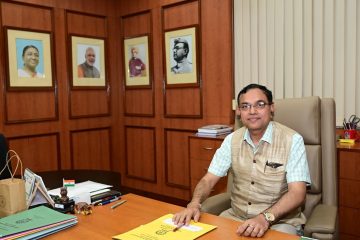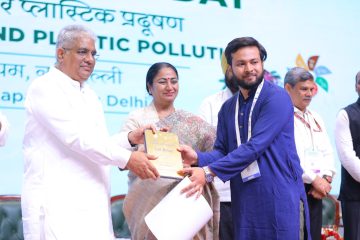“The duty of universities, more than ever now, is to train students to think critically,” said Prof. Ben L. Feringa during his visit to IIT Kharagpur

Professor Ben L. Feringa won the 2016 Nobel Prize in Chemistry together with Jean-Pierre Sauvage (France) and Sir James Fraser Stoddart (UK) for their work on the development of molecular machines. He has been a Professor of Chemistry at the University of Groningen since 1988. In 1999, his discovery of the ‘molecular motor’ – a light-driven rotary molecular motor -was widely recognized as a spectacular scientific breakthrough. Prof. Feringa is internationally recognized as a pioneer in the field of molecular engines. One of the potential applications of his engines is the delivery of medication inside the human body. Besides molecular engines, Prof. Feringa is also involved in catalysis and smart medication that can, for instance, be turned on and off by light.
Prof. Feringa was at IIT Kharagpur to deliver the Sir Jnan Chandra Ghosh Memorial Lecture: “The Art of Building Small, from Molecular Switches to Motors” on March 18, 2019. He is visiting India as the Raman Chair of the Indian Academy of Sciences. KGPChronicle visited him at the Technology Guest House prior to his lecture at the Kalidas Auditorium.
Excerpts from the interview: Watch Video
You have often said, “Let universities be playgrounds.” Could you please elucidate?
I strongly believe that universities should encourage young students to think very creatively…. We should go across borders towards our future. That means we should have a lot of freedom to think, to invent, to discover and to learn. And that is what I mean by playground – a playground to discover, to invent, to learn. We should not forget that this is a major duty and task for our universities – to help students cross borders and go towards unknown territories, to help them to realize their dreams and to come across new opportunities and options for the future of our society, industry and for our people.
You have been travelling since early March throughout India. What do you make of the research environment in India?
I am greatly impressed by the ongoing research, the drive, enthusiasm and also investments that have been made. Of course, there is lot to be done…. This morning we had great discussions at the Institute, and at the chemistry department. They showed me some of the ongoing programs and I was very much impressed by a lot of their work.
Professor, your specialization is ‘molecular engines’. What relevance do they have to our lives?
We are extremely good at building all kinds of machines – cars, planes, trains, aircraft – but we are not good in producing anything that moves spontaneously. That we can see each other, talk to each other, lift up our arms and walk around are due to tiny motors and machines that power life – nanoscale molecular machines and motors… But we hardly have any idea of how to do that by molecular design. Say a piece of plastic that moves, a drug that can adapt its state to the purpose it is needed, tiny robots that can do its job, smart materials – think of a window that could clean itself… or the fact that if you have a scratch in your car, the material just pops open and repairs itself. This is what happens in your body. But it is only now that we are getting the first pieces of plastic which can self-heal.
There is a whole lot going in this area. The whole thing of making things dynamic, responsive, moving is trying to get inspiration from Mother Nature, from your own body and then translate them into smart materials, tiny machines etc. This will change the way we look at materials and do things. This is fundamental research where we are looking 20-30-50 years ahead.
Is there anything you are excited about doing at present?
What we have been excited about for the past two years is making molecular muscles. We are also seeing if we can make responsive surfaces, to see if we can move things, repair things autonomously etc. I am very much interested in understanding how we can explore all this motion to make new materials.
And photopharmacology?
Yes, that is the other area we are excited about. Since we can make responsive systems at the molecular level at the nanoscale, we can now make pharmaceuticals which we can switch on and off, i.e. smart drugs. Of course, this is still at a very early stage. We all know of the problem of antibiotic resistance. If you can make an antibiotic that can be switched on at the spot where it is needed, and does nothing to the rest of the body… if it switches off automatically after 24-48 hours, gets into the environment, there is no resistance build up because there is no antibiotic anymore.
Take also precision therapy. This is another area we are excited about. We work with medical people in the hospital. This is an area with a lot of promise. Many groups around the world are working on this. This is a new field, may be 5-6 years old.
From your life, what do you think the role of a mentor should be?
Ah, the role of a mentor. I am a bit like a coach and try to stimulate my students. But we work as a team. It is not that I dictate all the time what is to be done. Of course, I have ideas, and I try to put a framework for them to work. But the most important role of a mentor is that we stimulate young people because all these people, even those at this Institute as I saw during my interaction today morning, are highly talented. So what we need is to encourage this talent and help them, stimulate them so that they come up with very creative things..
There is a misunderstanding because people often think that universities train them for today. No. We train them for the future. They will run your companies, do the innovation, make new things possible in society in 10-20-30 years. That is our future. We should train them, encourage them, and stimulate them to be creative, to be critical. This is my great task -to help them to be critical.
What is your message for the young researchers of IIT Kharagpur? I will say ‘follow your dreams’. They are all highly talented as I have mentioned. They should follow their dreams to find out what gives them a lot of energy. And also not to be afraid to do new things. Also to be critical. This is what we should do at universities – to find out what they love to do, because that gives them enthusiasm and spirit. But also we should help them learn to differentiate between facts and fiction. We get completely flooded with information. There is a tsunami of information through our smartphones and internet. And there is a lot of nonsense. We should train our students, and this is the duty of universities more than ever, as well as schools – we should train them to think critically – what does this information mean? Is this useful information? Is this based on facts, data and insight. Quality of thought is very important, and this is what we have to train students to learn.
Photo and Video by Arnab Moitra



